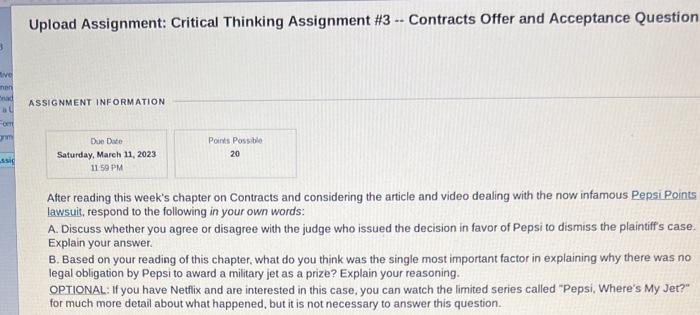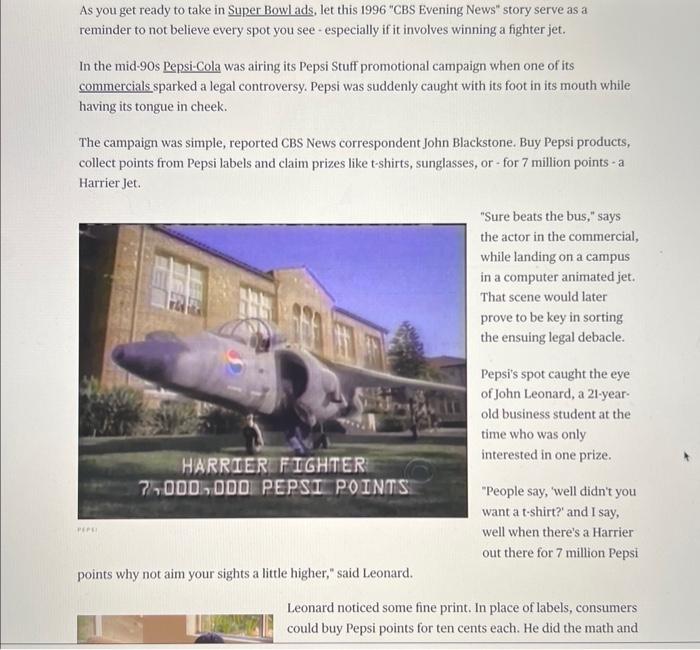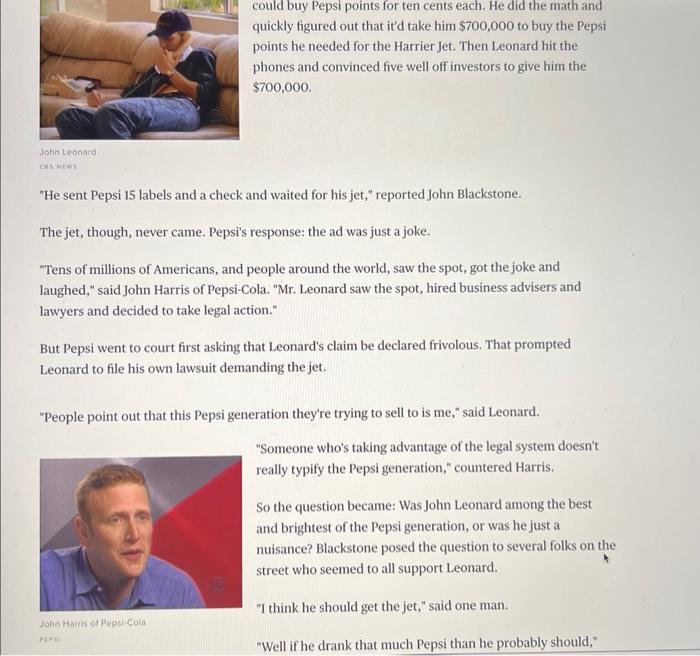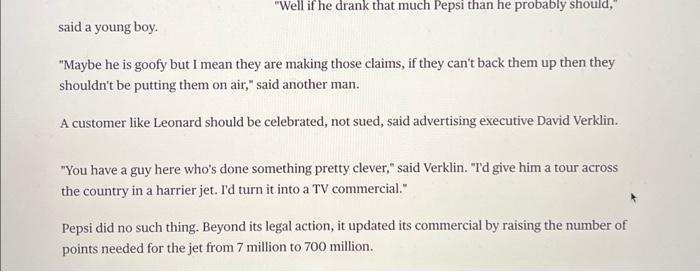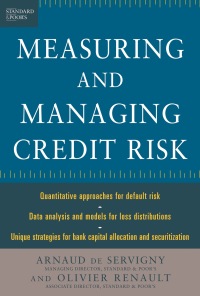Upload Assignment: Critical Thinking Assignment \#3 - Contracts Offer and Acceptance Questior ASSIGNMENT INFORMATION After reading this week's chapter on Contracts and considering the article and video dealing with the now infamous Pepsi Points lawsuit, respond to the following in your own words: A. Discuss whether you agree or disagree with the judge who issued the decision in favor of Pepsi to dismiss the plaintiff's case Explain your answer. B. Based on your reading of this chapter, what do you think was the single most important factor in explaining why there was no legal obligation by Pepsi to award a military jet as a prize? Explain your reasoning. OPTIONAL: If you have Netfix and are interested in this case, you can watch the limited series called "Pepsi, Where's My Jet?" for much more detail about what happened, but it is not necessary to answer this question. As you get ready to take in Super Bowl ads, let this 1996 "CBS Evening News" story serve as a reminder to not believe every spot you see - especially if it involves winning a fighter jet. In the mid-90s Pepsi-Cola was airing its Pepsi Stuff promotional campaign when one of its commercials sparked a legal controversy. Pepsi was suddenly caught with its foot in its mouth while having its tongue in cheek. The campaign was simple, reported CBS News correspondent John Blackstone. Buy Pepsi products, collect points from Pepsi labels and claim prizes like t-shirts, sunglasses, or - for 7 million points - a Harrier Jet. "Sure beats the bus," says the actor in the commercial, while landing on a campus in a computer animated jet. That scene would later prove to be key in sorting the ensuing legal debacle. Pepsi's spot caught the eye of John Leonard, a 21-yearold business student at the time who was only interested in one prize. "People say, 'well didn't you want a t-shirt?' and I say, well when there's a Harrier out there for 7 million Pepsi points why not aim your sights a little higher," said Leonard. Leonard noticed some fine print. In place of labels, consumers could buy Pepsi points for ten cents each. He did the math and could buy Pepsi points for ten cents each. He did the math and quickly figured out that it'd take him $700,000 to buy the Pepsi points he needed for the Harrier Jet. Then Leonard hit the phones and convinced five well off investors to give him the $700,000 "He sent Pepsi 15 labels and a check and waited for his jet," reported John Blackstone. The jet, though, never came. Pepsi's response: the ad was just a joke. "Tens of millions of Americans, and people around the world, saw the spot, got the joke and laughed," said John Harris of Pepsi-Cola. "Mr. Leonard saw the spot, hired business advisers and lawyers and decided to take legal action." But Pepsi went to court first asking that Leonard's claim be declared frivolous. That prompted Leonard to file his own lawsuit demanding the jet. "People point out that this Pepsi generation they're trying to sell to is me," said Leonard. said a young boy. "Maybe he is goofy but I mean they are making those claims, if they can't back them up then they shouldn't be putting them on air," said another man. A customer like Leonard should be celebrated, not sued, said advertising executive David Verklin. "You have a guy here who's done something pretty clever," said Verklin. "I'd give him a tour across the country in a harrier jet. Id turn it into a TV commercial." Pepsi did no such thing. Beyond its legal action, it updated its commercial by raising the number of points needed for the jet from 7 million to 700 million. In the end, Leonard's lawsuit fizzled out. A court granted a summary judgment in favor of Pepsi and ruled that, "no objective person could reasonably have concluded that the commercial actually offered consumers a Harrier Jet." The court also added this gem of a reason in its dismissal of the case: "The callow youth featured in the commercial is a highly improbable pilot, one who could barely be trusted with the keys to his parents' car, much less the prize aircraft of the United States Marine Corps." And that's the way it was on Thursday, August 8, 1996
